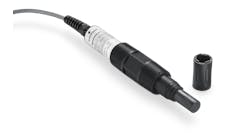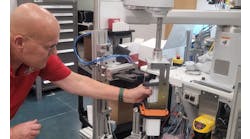I know I've said this before, but you don't have to read this column. Give yourself a break. Most readers know more than I do about process control and automation, and don't need my help to do what they know is right for their applications, facilities and organizations.
All I can do is hunt for expert input, experiences, best practices and advice, as well as useful news, boil them down, and present them in hopefully engaging formats. The research and reporting required to find all these data sources and collect their information is often extensive, and I'd bet it's similar to the research that many process engineers must conduct to complete their various monitoring, optimization, maintenance and renovation projects. I'd also wager that all the data and other details coming in can be overwhelming for everyone to deal with.
But so what if we glaze over and stare blankly for awhile? Many of us were probably going to do it even before all the input arrived. Plus, it's not as if it was a physiological health hazard like black lung or something, right?
Unfortunately, I'm beginning to believe that information overload is a more serious problem then just being slightly catatonic for a brief period. I think it may actually take a lot longer to recover from incoming data floods, and that little if any meaningful analysis or decision making can be done until we've had enough time to mentally internalize it. For example, I recently had an opportunity to sit still for 30-40 minutes—a real mini vacation—and I noticed a remarkably sequential stream of recent memories of editorial and other tasks bubbling up in my head, and then settling back down like they were going into a file cabinet.
I don't practice meditation, but I've heard that one of its principal goals is to calm the mind's usual restlessness by letting it cast about, allow distractions to come and go, and then refocus. I've also heard that the best way to learn a new skill is to get as much hands-on practice as possible, and then get a good night's sleep, which allows the neural pathways established during the day to get fixed in long-term memory.
The only reason I'm raising these issues now is because several sources for this issue's "Close the skills gap" cover story independently reported that critical thinking was one of the primary skills that rookie and veteran process engineers need to develop for better problem solving and collaboration. However, I'm pretty certain some preparation will be needed to get critical thinking established and rooted in place, so it can be employed to best effect over the long-term.
First, unplug and turn off all unnecessary input. I know this can't be done for very long. However, for at least a short period every day or other day, stop the incoming flood of input and data of all kinds, catch your breath, and give your mind a chance to catch up and assimilate what it's taken in. This is probably essential to successfully encouraging critical thinking, and allowing some of that input to synthesize and come together into useful optimization and wiser decisions. A good fermentation or yogurt analogy would work here.
Second, filter out and dispose of as much pointless input as possible. Much of what comes in via email, mainstream media and other avenues will never be helpful, and I believe better ways of screening them out have to be developed. In general, the stuff that comes to me independently is 95% because it's something that someone wants to promote. Conversely, most of the material that I seek and find is helpful because it's directed by my search for answers, and most of my sources aren't trying to sell baloney. Filtering input will hopefully concentrate the usefulness of the remaining input, allow more attention to be focused on it, and hopefully lead to more of those terrific decisions.
Third, practice organization and prioritizing even the saved input and material that you allow in. Even after filtering, there's still going to be a lot of information to deal with, and sorting it into logical categories or use cases will likely enable it to be quickly recalled later when it an do the most good.
Hopefully, you can employ some of these methods to aid critical thinking. Better yet, I'm sure many readers knew them already, and filtered this column out at the beginning.






